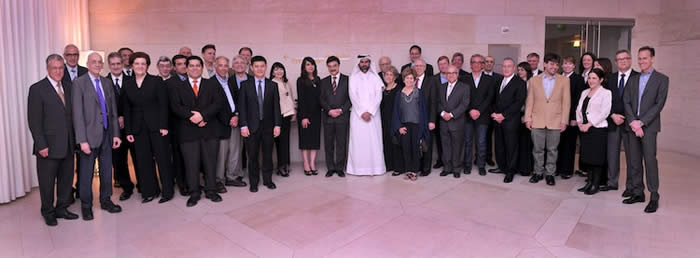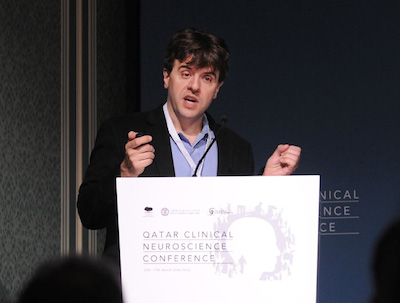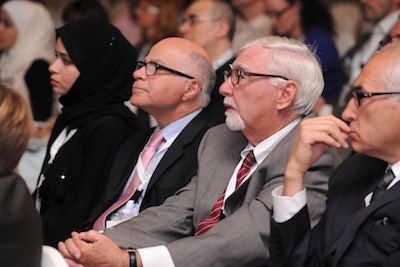International conference hears of latest developments in neurology
March, 2014

Dr. Javaid Sheikh, Dean of WCMC-Q, and Dr. Faleh Mohamed Hussain Ali, assistant secretary general for policy affairs
at the Supreme Council of Health, with some of the speakers, delegates and VIPs who attended the conference.
Qatar Clinical Neuroscience Conference has ended following two and a half days of high-level discussion of the latest advances in neurological treatments.
The conference was organized by Qatar Foundation (QF), Weill Cornell Medical College in Qatar (WCMC-Q) and The New York Academy of Sciences (The Academy) to bring together the world’s finest minds in the arena of neuroscience. The symposium was developed to incorporate two of the most common neurological issues facing academia and the medical profession - affective disorders like depression, and strokes and traumatic brain injury.
The audience heard that these issues have been defined by the World Health Organization as two of the most serious health problems today, affecting not just Qatar but the entire globe. In fact, of the 20 leading causes of death, 14 of them are based in neuroscience while one in six people will experience a serious episode of depression at some point in their lives.
Dr. Javaid Sheikh, Dean of WCMC-Q, said one of the aims of the conference was to facilitate collaboration between neuroscientists at institutions across the globe. In addition, he said that the latest research would be shared with physicians in Qatar, improving patient care and encouraging further research locally.
Dr. Sheikh said: “One of the outcomes of a conference like this is the creation of a network and the building of relationships.
“Qatar’s National Research Strategy states that institutions should come together and work together. That is happening and will happen more in the future as a direct result of this symposium.
“Over the course of the conference we heard from some of the finest minds working today in the field of neuroscience. It was hugely beneficial to hear of the latest research data and advances in clinical care and this has opened up new opportunities and areas of research for us all.”
Conference delegates heard from such world-renowned authorities as Dr. Matthew E. Fink, Louis and Gertrude Feil Professor and Chairman of the Department of Neurology at Weill Cornell Medical College in New York.

Dr. Karl Deisseroth, the D. H. Chen Professor of Bioengineering
and of Psychiatry and Behavioral Sciences at Stanford University
in the U.S, gave delegates an insight into the latest technology
in the field.
Dr. Fink said that strokes are the second leading cause of death in the world but that if the knowledge we have is applied to the general population, 80 per cent of strokes can be prevented. He said that epidemiological studies had shown that stress was a huge risk factor for strokes - and not just ‘bad’ stress. Even joyful occasions feature stress and, startlingly, the risk of suffering a stroke doubles in the two weeks following a birthday.
The very latest research was also showcased at the conference with Dr. Karl Deisseroth, the D. H. Chen Professor of Bioengineering and of Psychiatry and Behavioral Sciences at Stanford University in the U.S., explaining how new techniques could provide a precise 3D image of a brain, allowing scientists to examine regions which otherwise would require surgery. He also demonstrated how fiber optics could shine light on specific areas of the brain, so affecting the anxiety response in mice. Similar research is being conducted on how the same technique could be used to learn more about disorders like depression, social dysfunction and even drug addiction.
Ellis Rubinstein, President and CEO of The New York Academy of Sciences, said Dr. Deisseroth’s lecture was a prime example of how such conferences could spur on the generation of knowledge.
Mr. Rubinstein said: “Symposia like Qatar Clinical Neuroscience Conference disseminate information across national boundaries and provide new avenues of research for scientists and physicians working across a broad spectrum of specialties. They also encourage debate through direct interaction with the speakers, allowing for critical analysis in an informal environment.
“The Academy’s collaboration with WCMC-Q and QF can help achieve HH Sheikha Moza’s goal of creating a knowledge-based economy by connecting what happens here with the rest of the world.”

Delegates included many of WCMC-Q's faculty, including
Dr. Ziad Kronfol and Dr. Leo Streletz. Dr. Kronfol also
addressed the conference on the subject of bipolar disorder.
Among the presentations directly related to Qatar was Dr. Ziad Kronfol’s talk entitled Bipolar Disorders in the Arab World: Clinical and Genomic Data. Dr. Kronfol, Professor of Psychiatry at WCMC-Q, and a consultant at Hamad Medical Corporation, explained to delegates that his research within Qatar and the region showed that while many of the characteristics of patients with bipolar disorder were shared across international borders, there were some aspects more common to the Arab world.
“Bipolar patients in the Arab world more often exhibit conditions not typically associated with bipolar disorder, like diabetes and obesity,” said Dr. Kronfol. “The disorder also tends to run in families. However, bipolar patients in the Arab world do not display as many additional psychiatric conditions as those in other regions.”
In all, 33 lectures were given by academics from across the world from institutions in the U.S., the Middle East and Europe.
The conference was hailed a success by all delegates to the conference and was a demonstration of what can be done when organizations like QF, WCMC-Q and the Academy work together for the common good. It was also a demonstration of Qatar’s continued achievements in developing a knowledge-based economy for a post-hydrocarbon future.
